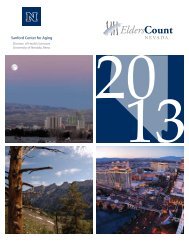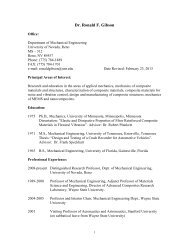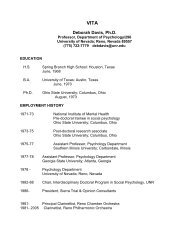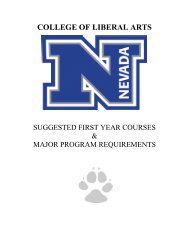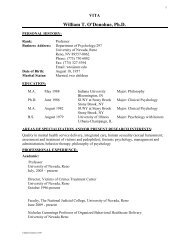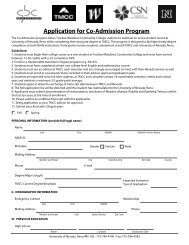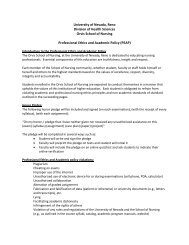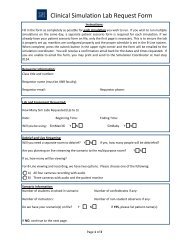Nevada Silver and Blue - University of Nevada, Reno
Nevada Silver and Blue - University of Nevada, Reno
Nevada Silver and Blue - University of Nevada, Reno
- TAGS
- nevada
- reno
- www.unr.edu
Create successful ePaper yourself
Turn your PDF publications into a flip-book with our unique Google optimized e-Paper software.
On Campus<br />
Antonuccio challenges antidepressant hype<br />
By John Wheeler<br />
David Antonuccio has some remarkable<br />
things to say about the drug<br />
industry <strong>and</strong>, in particular, the efficacy <strong>of</strong><br />
its number one product: antidepressants.<br />
In a nutshell, the <strong>University</strong> <strong>of</strong> <strong>Nevada</strong><br />
School <strong>of</strong> Medicine pr<strong>of</strong>essor <strong>of</strong> psychiatry<br />
<strong>and</strong> behavioral sciences says: antidepressant<br />
drug effects may be far smaller<br />
than touted <strong>and</strong> side effects far greater;<br />
there’s no persuasive evidence that a<br />
deficiency <strong>of</strong> brain serotonin causes<br />
depression (the rationale for using most<br />
antidepressants); financial <strong>and</strong> political<br />
interests have biased research <strong>and</strong><br />
medical education; <strong>and</strong> psychotherapy<br />
appears to be as effective as antidepressants<br />
in treating depression <strong>and</strong> even<br />
better at preventing relapse.<br />
In an article in the December issue <strong>of</strong><br />
the journal American Psychologist, cowritten<br />
with School <strong>of</strong> Medicine colleague<br />
William Danton <strong>and</strong> Terry Michael<br />
McClanahan <strong>of</strong> Permanente Medical<br />
Group, Antonuccio details the extent <strong>of</strong><br />
the pharmaceutical industry’s influence on<br />
medicine <strong>and</strong> proposes practical steps that<br />
could be taken to preserve the credibility<br />
<strong>and</strong> integrity <strong>of</strong> scientific research.<br />
“I don’t think the word has gotten out<br />
about this wealth <strong>of</strong> data showing the<br />
small advantage <strong>of</strong> these medications,”<br />
Antonuccio says.<br />
For example, Antonuccio says somewhere<br />
between 20 percent <strong>and</strong> 35<br />
Photo by Jean Dixon<br />
4 <strong>Nevada</strong> <strong>Silver</strong> & <strong>Blue</strong> • March/April 2004<br />
percent <strong>of</strong> antidepressant studies are not<br />
published, <strong>and</strong> <strong>of</strong> those, it looks like as<br />
many as 90 percent may have unfavorable<br />
or neutral results.<br />
In other words, many studies show<br />
antidepressants are no better than a<br />
placebo <strong>and</strong> get buried by the drug<br />
companies. Antonuccio is able to track<br />
these unpublished studies through the<br />
Food <strong>and</strong> Drug Administration’s database.<br />
The FDA requires submission <strong>of</strong> all<br />
research data, but doesn’t require<br />
publication. Data analysis such as this is<br />
Antonuccio’s stock in trade. His conclusions,<br />
although based on meticulously<br />
documented analysis — <strong>of</strong>ten drawn<br />
from drug companies’ own data — are<br />
not always welcomed, even within his<br />
own pr<strong>of</strong>ession.<br />
“One <strong>of</strong> the reasons might be that the<br />
beliefs that are challenged by the data I<br />
present are strongly held <strong>and</strong> it’s<br />
upsetting that things might be different<br />
than people have believed for so long,”<br />
he says. “Fortunately, I work in a department<br />
<strong>and</strong> at a medical school that<br />
celebrates scientific curiosity <strong>and</strong><br />
intellectual diversity.”<br />
Antidepressants are the top selling<br />
drug category, with as many as one in<br />
eight adult Americans having taken one<br />
in the last 10 years.<br />
“One <strong>of</strong> the theories is that depression<br />
is a chemical imbalance,” Antonuccio says.<br />
Photo by Jean Dixon<br />
David Antonuccio, pr<strong>of</strong>essor <strong>of</strong><br />
psychiatry <strong>and</strong> behavioral sciences.<br />
“But ... there’s no convincing data that<br />
show any sort <strong>of</strong> biological imbalance<br />
causes depression. That’s not to say there<br />
are not chemical changes associated with<br />
depression <strong>and</strong> there may be immune<br />
system changes. We have to carefully<br />
think about making the logical leap that<br />
because something is associated with<br />
depression or anxiety, it is actually the<br />
cause <strong>of</strong> it.”<br />
An exp<strong>and</strong>ed version <strong>of</strong> this story can be<br />
found on the university Web site: http://<br />
www.unr.edu/nevadanews/<br />
detail.asp?id=800<br />
Rockin’ for a good cause<br />
in Las Vegas<br />
On h<strong>and</strong> for a recent gala concert at the Mirage<br />
featuring the Eagles to benefit the <strong>Nevada</strong> Cancer<br />
Institute: (left to right) Master <strong>of</strong> Ceremonies Larry<br />
King, <strong>University</strong> <strong>of</strong> <strong>Nevada</strong> President John Lilley <strong>and</strong><br />
Gerrie Lilley. The gala, “Rock for the Cure,” raised $2.6<br />
million toward the institute, which is currently under<br />
construction in Las Vegas. Eight <strong>Nevada</strong> faculty<br />
currently hold adjunct positions at the institute, which<br />
aims to eventually have facilities in both Las Vegas <strong>and</strong><br />
<strong>Reno</strong>. When built, the non-pr<strong>of</strong>it institute will be the<br />
state’s first comprehensive cancer research <strong>and</strong><br />
treatment center.<br />
— John Wheeler



